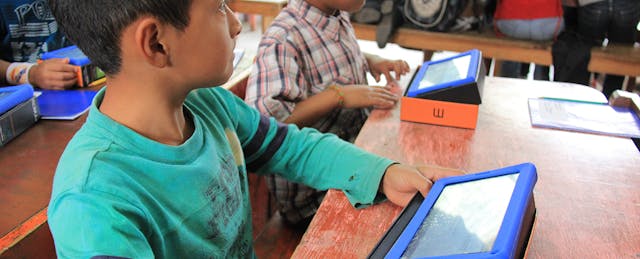In the conversation around digital learning, there’s a sobering statistic that often goes overlooked: 74. It’s the percentage of students around the whole who lack consistent internet connectivity—and access to many of the tools and online courseware that some have hailed as the solution to education gaps.
Some, like Facebook’s Mark Zuckerberg, have taken on the monstrous task of bringing internet access to billions of people around the world. Others, like Learning Equality, have taken a different route. Rather than waiting for the internet to come to learners around the world, the education nonprofit based out of La Jolla, Calif., aims to make digital learning content available to students whether or not they have web access.
Now, Learning Equality offers a new platform in store to help achieve that: Kolibri, an open-source application that makes videos, textbooks and lessons available to learners around the world available offline. But the team has more work to do, which is why Google.org, the philanthropic arm of the Silicon Valley giant, is stepping in. Today, the organization announced it is investing $5 million in Kolibri as part of a larger effort that will give $50 million in grants to education technology initiatives and nonprofits around the world over the next year.
“We know digital tools and online materials have added a lot of value to students who have access to them. But for students who don’t have connectivity, they are essentially living in a different century, using outdated textbooks and static materials that don’t resonate,” says Brigitte Hoyer-Gosselink, Education Lead at Google.org. “We think this has an opportunity to bridge that gap.”
Among the nine groups selected for Google.org’s big give—which also includes War Child Holland ($2 million), Khan Academy ($5 million), StoryWeaver ($3.6 million) and Million Sparks Foundation ($1.2 million)—Learning Equality scored a long straw with its $5 million. “[Kolibri] is one of the bigger bets we are making,” says Hoyer-Gosselink.
Kolibri is the next iteration of KA Lite, an offline version of Khan Academy that Learning Equality Executive Director Jamie Alexandre debuted in 2012 while interning at the organization. Since establishing Learning Equality in April 2014, KA Lite has been installed in more than 175 countries, where the nonprofit claims at least 4 million learners have been able to access Khan Academy’s instructional tools without internet.
With a financial boost from Google.org, which has donated more than $110 million in the last five years to education initiatives, Learning Equality aims to increase its content library by adding to what the platform has already accomplished with KA Lite. In practice, that would look like continued offline access to more than 9,000 Khan Academy videos, plus authoring tools that will enable users to create locally-relevant content. Also new is the ability for content to be directly uploaded and shared back into the platform’s global repository. “We work with local partners to bring in their content and match local curricular standards,” explains Alexandre.
Kolibri also offers teachers the ability to better understand student progress with access to performance data via “coach reports.” According to Alexandre, the platform will give teachers pedagogical recommendations for how “concepts might be taught to guide the use of the curriculum.”

Other elements of the product, such as how the tool is installed and downloaded to the offline network, will function similarly to KA Lite. (There is one device that connects to the internet to download the content, after which it can share the materials with all the other devices. Content can also be transferred via USB)
In addition to financial support, Google will also provide grantees with expertise and technical support. For Kolibri, which is slated to go live summer 2017, Google engineers will spend four weeks working with Learning Equality’s product team on tasks such as UX/UI, content integration and video compression.The company will offer guidance around marketing and internal training strategies. “One of the big pieces of the support from Google.org is allowing us to build out a five-person implementation team, which works with partners and trains the trainers who go into the schools to work with teachers,” says Alexandre.
With new content and capabilities on the Kolibri platform, Alexandre says the long-term goal will be to eventually replace KA Lite with its new iteration. The training support from Google.org will help in that effort, as well as Learning Equality’s plans to develop a “do-it-yourself implementation toolkit” that organizations and institutions can use to adopt Kolibri themselves. “We work with partners to learn and get feedback and iterate on that, and the scale comes through grassroots adoption,” he says.
Though the team officially began working on Kolibri in 2015, Alexandre says the idea for Kolibri has been the nonprofit’s mission from the start. “More than 90 percent of the lowest income population is offline,” he says. “In many ways, [online tools] can widen the [education] gap because the people who need it most are least able to access it.”
Looking ahead, Google.org is already scouting for its next round of projects to invest in. And by the end of 2017, Hoyer-Gosselink says the organization hopes to give grants to education nonprofits from 20 different countries.
“We are investing the remainder of this fund in the next year or so to nonprofits using tech to help kids learn in a more robust way,” she explains. “Because tech has a role to play to push forward that quality of learning, but only if everyone has access.”


